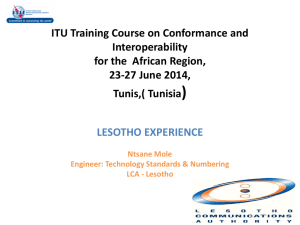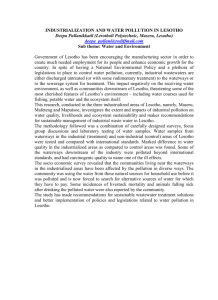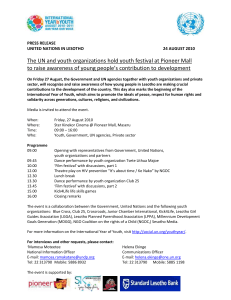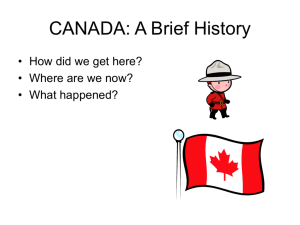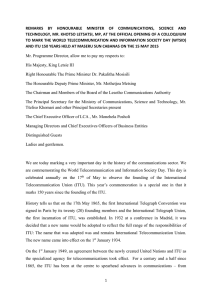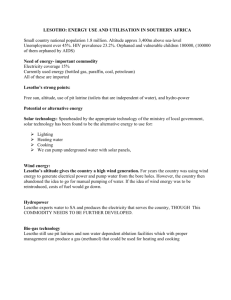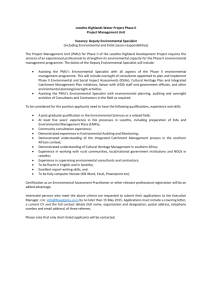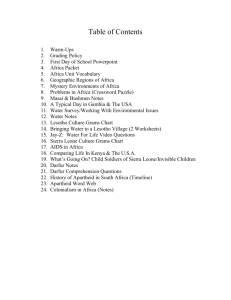REMARKS BY THE CHIEF EXECUTIVE ... COMMUNICATIONS AUTHORITY, MR. MONEHELA POSHOLI, ...
advertisement
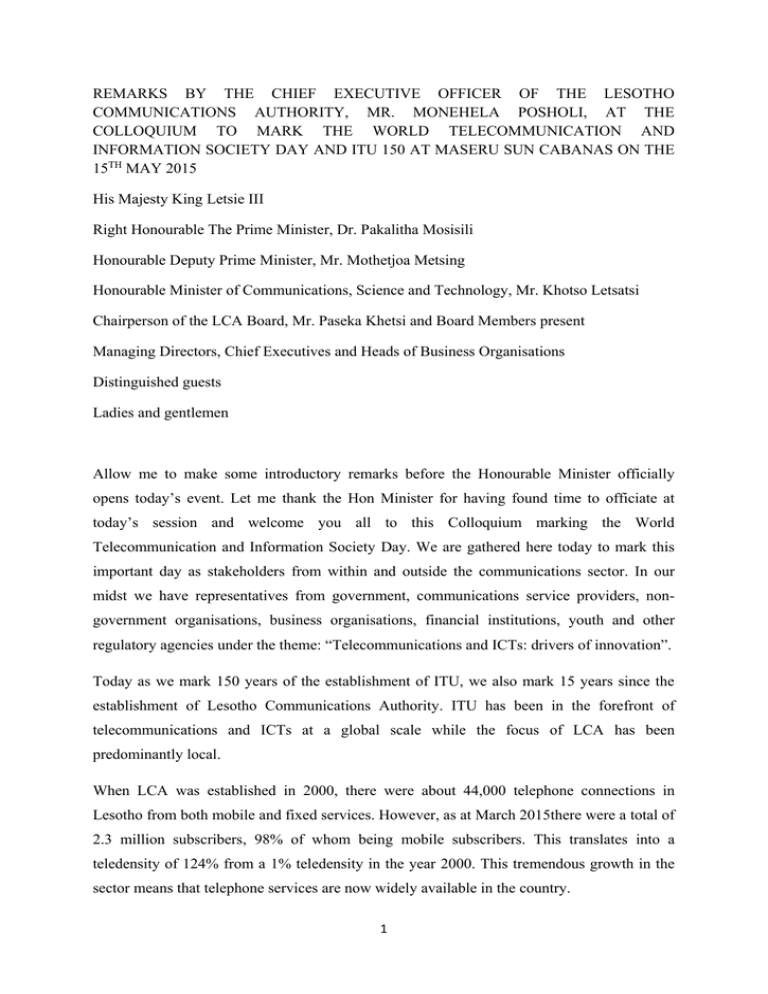
REMARKS BY THE CHIEF EXECUTIVE OFFICER OF THE LESOTHO COMMUNICATIONS AUTHORITY, MR. MONEHELA POSHOLI, AT THE COLLOQUIUM TO MARK THE WORLD TELECOMMUNICATION AND INFORMATION SOCIETY DAY AND ITU 150 AT MASERU SUN CABANAS ON THE 15TH MAY 2015 His Majesty King Letsie III Right Honourable The Prime Minister, Dr. Pakalitha Mosisili Honourable Deputy Prime Minister, Mr. Mothetjoa Metsing Honourable Minister of Communications, Science and Technology, Mr. Khotso Letsatsi Chairperson of the LCA Board, Mr. Paseka Khetsi and Board Members present Managing Directors, Chief Executives and Heads of Business Organisations Distinguished guests Ladies and gentlemen Allow me to make some introductory remarks before the Honourable Minister officially opens today’s event. Let me thank the Hon Minister for having found time to officiate at today’s session and welcome you all to this Colloquium marking the World Telecommunication and Information Society Day. We are gathered here today to mark this important day as stakeholders from within and outside the communications sector. In our midst we have representatives from government, communications service providers, nongovernment organisations, business organisations, financial institutions, youth and other regulatory agencies under the theme: “Telecommunications and ICTs: drivers of innovation”. Today as we mark 150 years of the establishment of ITU, we also mark 15 years since the establishment of Lesotho Communications Authority. ITU has been in the forefront of telecommunications and ICTs at a global scale while the focus of LCA has been predominantly local. When LCA was established in 2000, there were about 44,000 telephone connections in Lesotho from both mobile and fixed services. However, as at March 2015there were a total of 2.3 million subscribers, 98% of whom being mobile subscribers. This translates into a teledensity of 124% from a 1% teledensity in the year 2000. This tremendous growth in the sector means that telephone services are now widely available in the country. 1 Honourable Minister, distinguished guests, ladies and gentlemen, Communications infrastructure remains a key enabling factor in the provision of communications services for various purposes. The expanded coverage country-wide, attributable to the Network Operators and the Universal Service Fund, has opened doors for the possible use of communications services to access government services if they are made available online. Efforts should therefore be made for government services to be gradually introduced on the electronic mode. An example could be the processing of application forms for identification cards and passport services where applications could be provided electronically between district offices and the central production centre. M-health is another area that can be further explored. Already, our country albeit in a small scale, has started benefiting in this area. Partners in Health initiated services where medical specialists as far afield as the state of Maryland in the US were consulted by doctors working in outfield clinic areas such as Hloahloeng and other mountains areas to provide health solutions. We however know that, with the right facilities, these consultations could be escalated to a real time scenario while a surgical operation is underway in the theatre room. Universities and schools are more and more exploiting the use of ICTs in education. Digitization of libraries and adaption of open access avails wider teaching materials and more resources to the student population. However all these services need more reliable internet services which can provide high resolution pictures and capacity for video streaming. One area that has notably adopted the use of communications services is the financial or banking sector. Few years back, most of us had no electronic banking cards, in fact; some of us were sceptical to have one. With the passage time and the confidence that has ensued, more people have adopted electronic banking cards in different forms and some are also moving into internet and mobile banking services. Mobile telephone services availed around the country present an opportunity to service the unbanked members of our society. Having noted the regulatory challenges that may emerge from allowing Communications Network Operators to carry financial services on their networks, LCA and Central Bank of Lesotho entered into a Memorandum of Understanding to coordinate their oversight regulatory functions in this area. As people use communications service beyond voice and texting, there is need for greater capacity in our networks. It is gratifying to note that our Network Operators are continuously 2 upgrading their networks. The government of Lesotho also had a foresight to invest in the East African Submarine Cable System (EASSy) whose capacity is now available in the country. In order to tackle the issues of backhaul, the company that operates this cable, WIOCC, has now developed a Virtual Landing Point which is now terminating at the Lesotho Internet Exchange Point at IEMS here in Maseru. With the capacity now available in Maseru, this provides mobile operators and internet service providers with unique and flexible bandwidth packages. To facilitate effective competition in the development of Internet services, the licensing framework was modified in 2013 to allow entry of network services licence holders that can self-provide international bandwidth. Hon Minister and Distinguished Ladies and Gentlemen As we commemorate the World Telecommunications and Information Society Day and the one hundred and fifty (150) years since ITU was founded, we need to take stock of what Lesotho has achieved and ask ourselves what we can do to harness the power of telecommunications and ICTs for advancement of our country’s economic growth. We should all embrace more innovation and creativity using ICT as a platform. We hope today’s forum will provide an excellent networking opportunity and exchange of ideas for innovative projects to be hatched for the good of our society and future generations. With these few words, on behalf of LCA, I wish to welcome you all to today’s colloquium and look forward to your contributions. I thank you for your kind attention. 3
